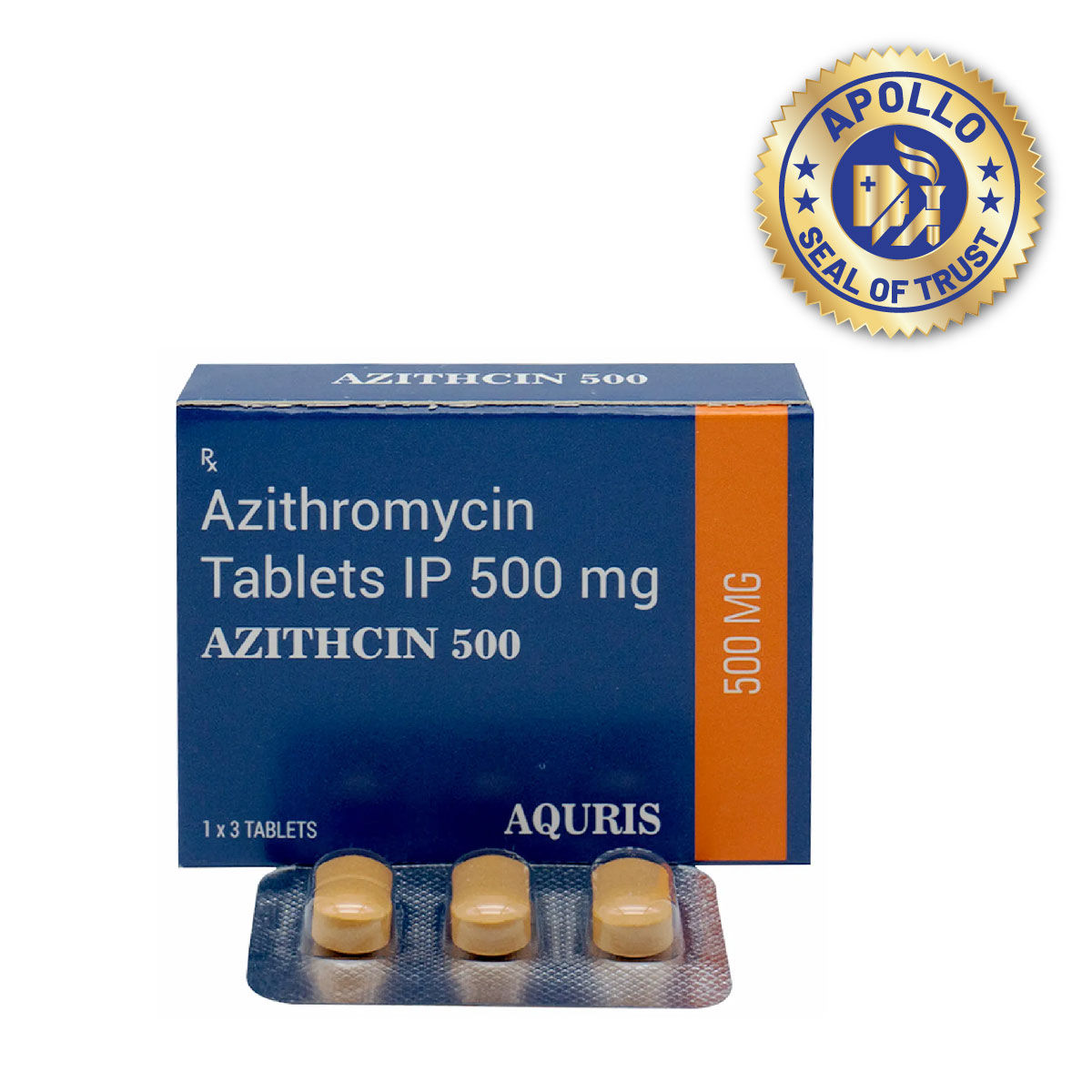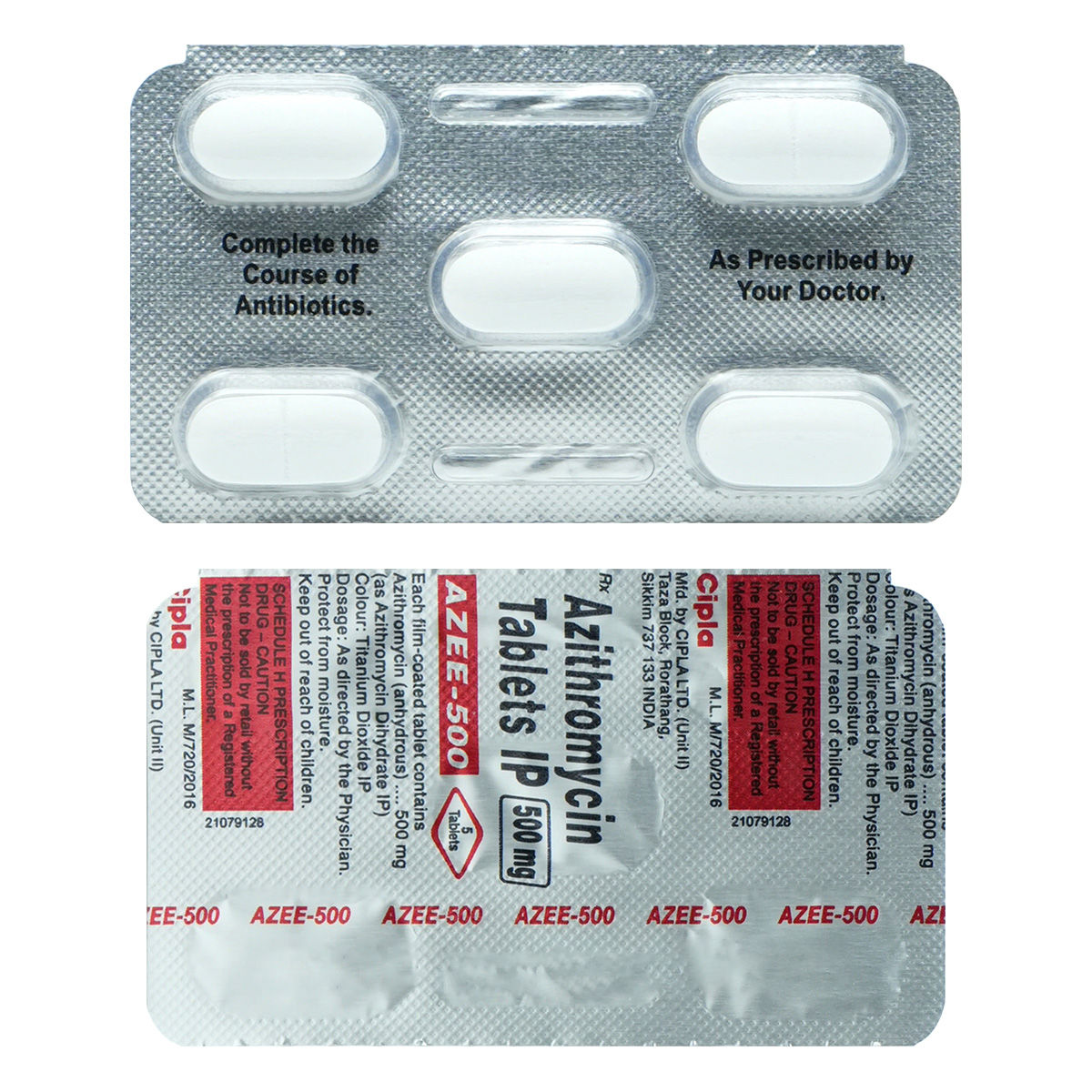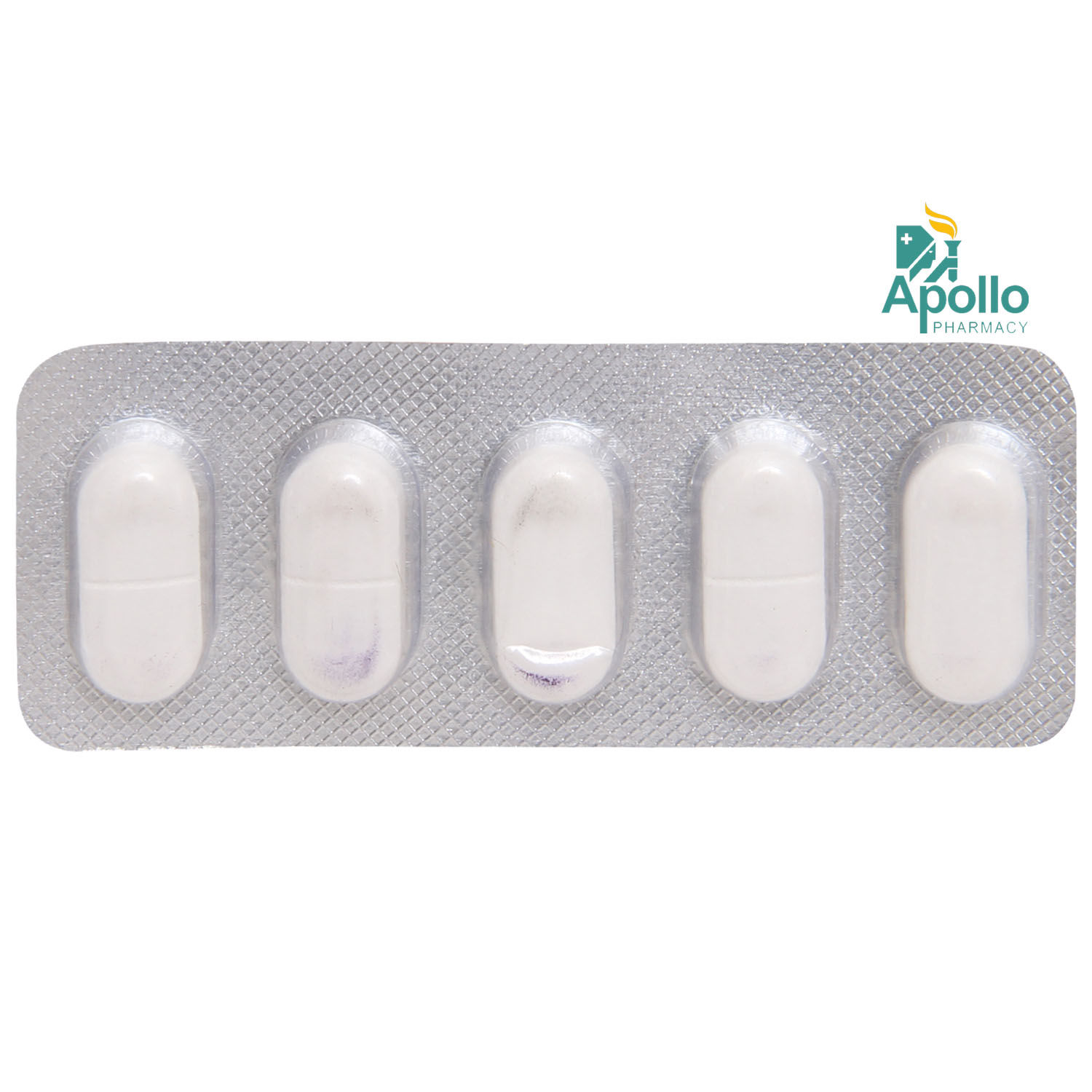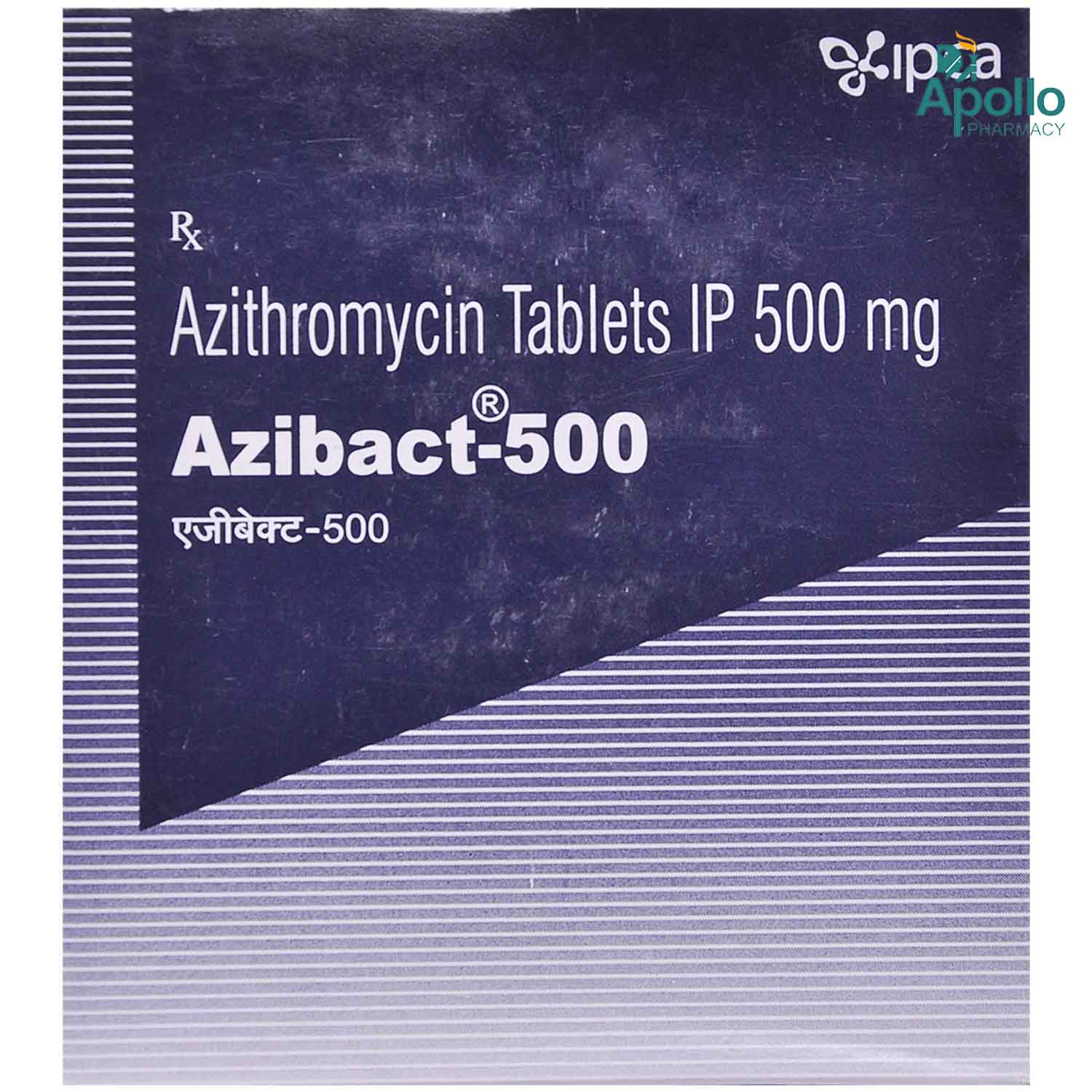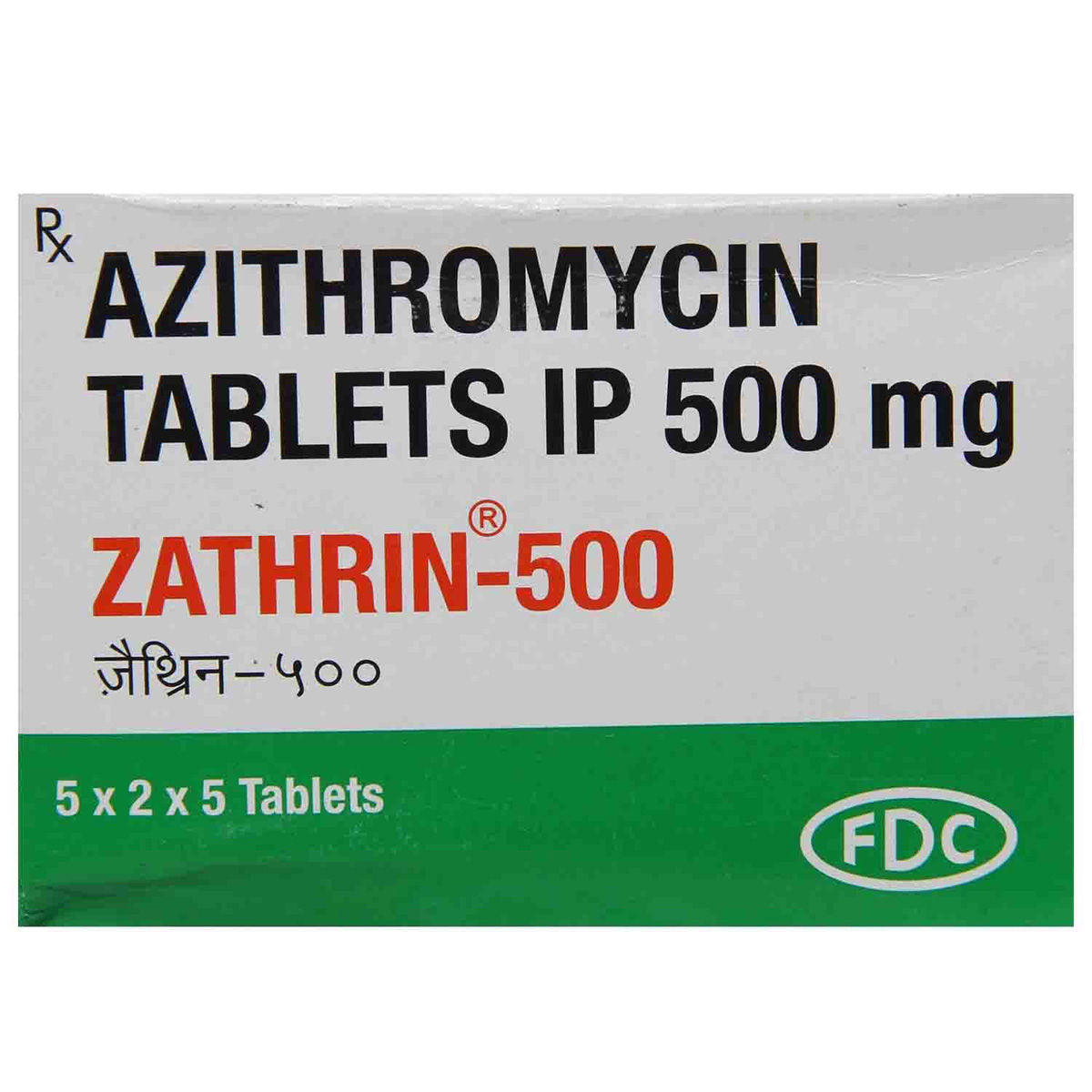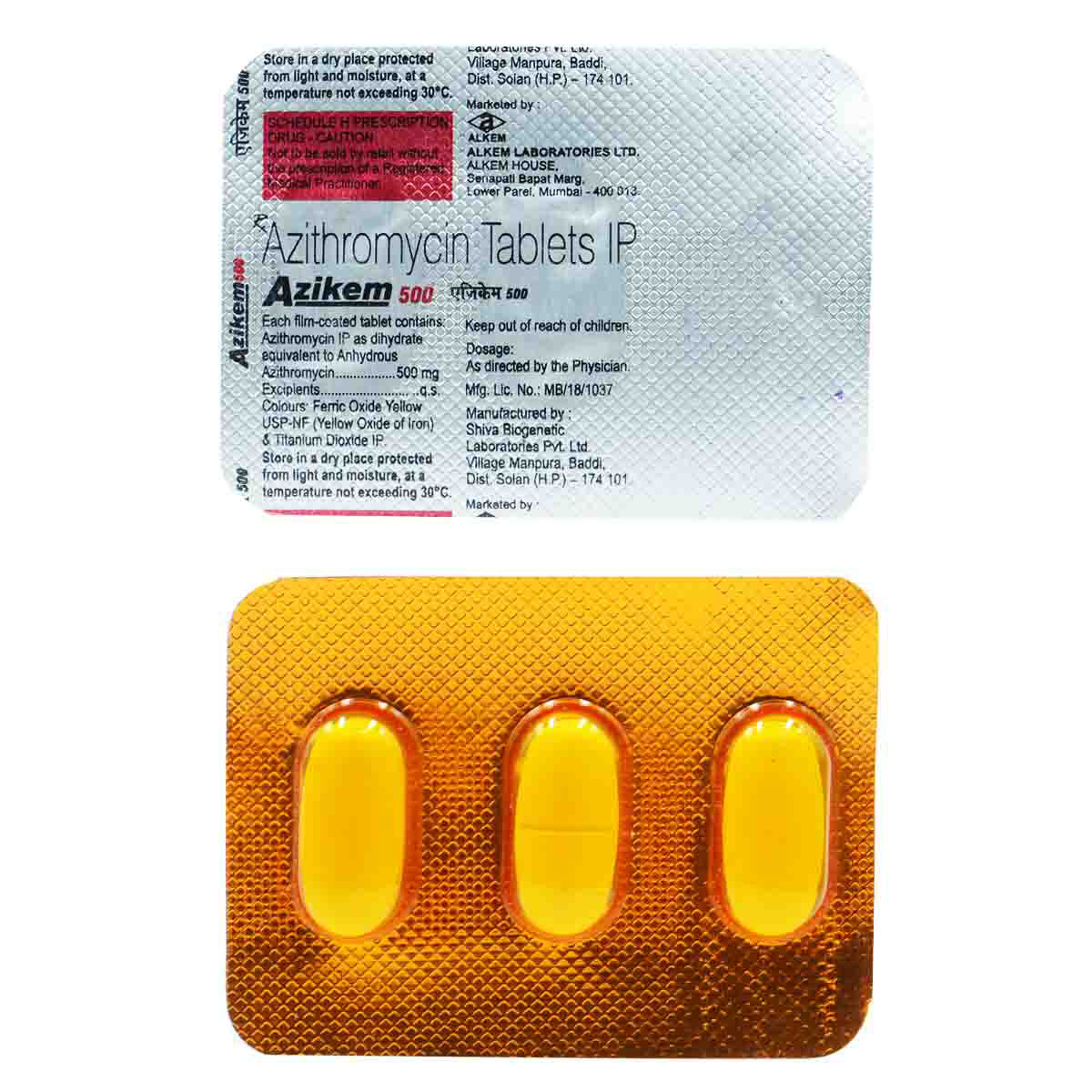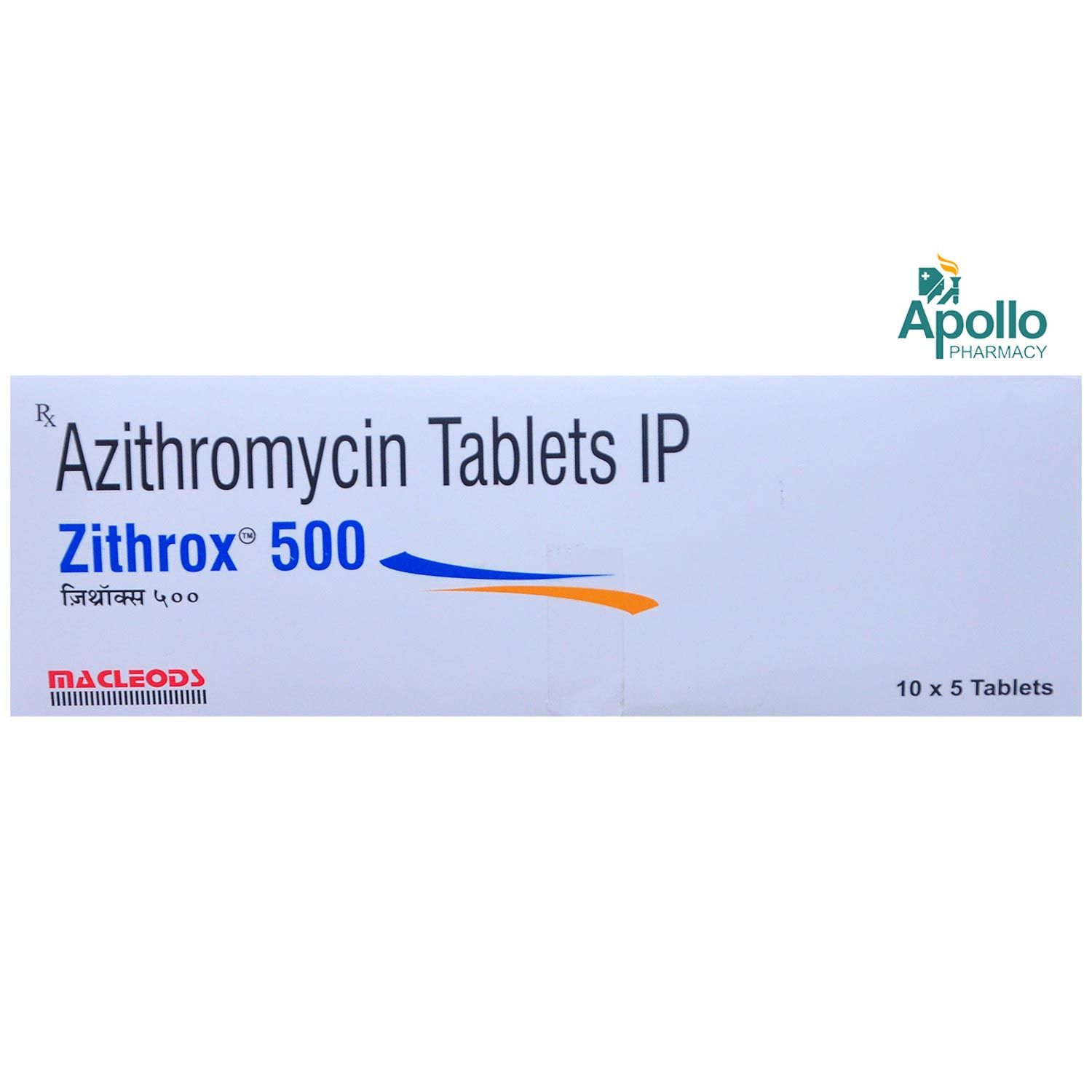Zady-500 Tablet 5's
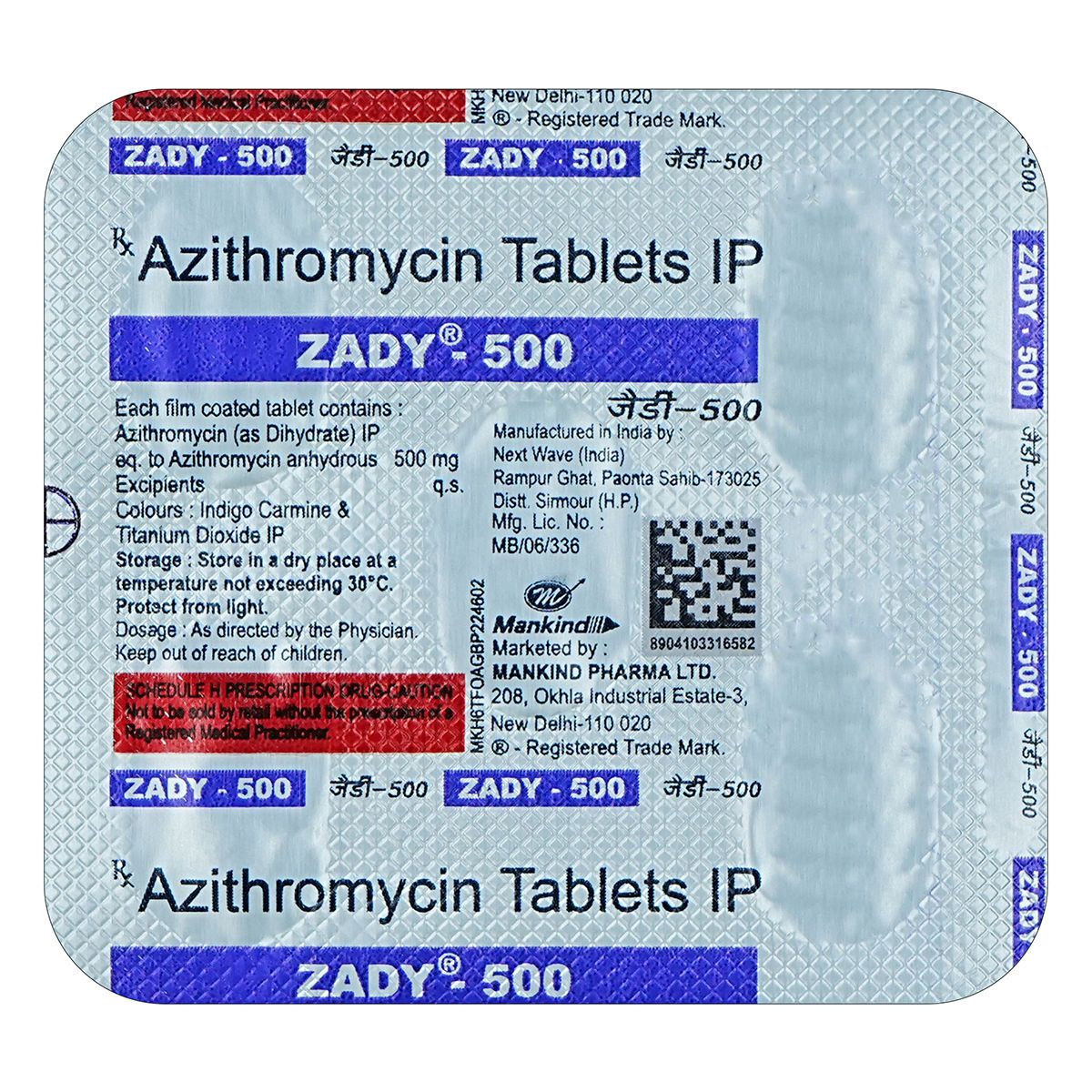
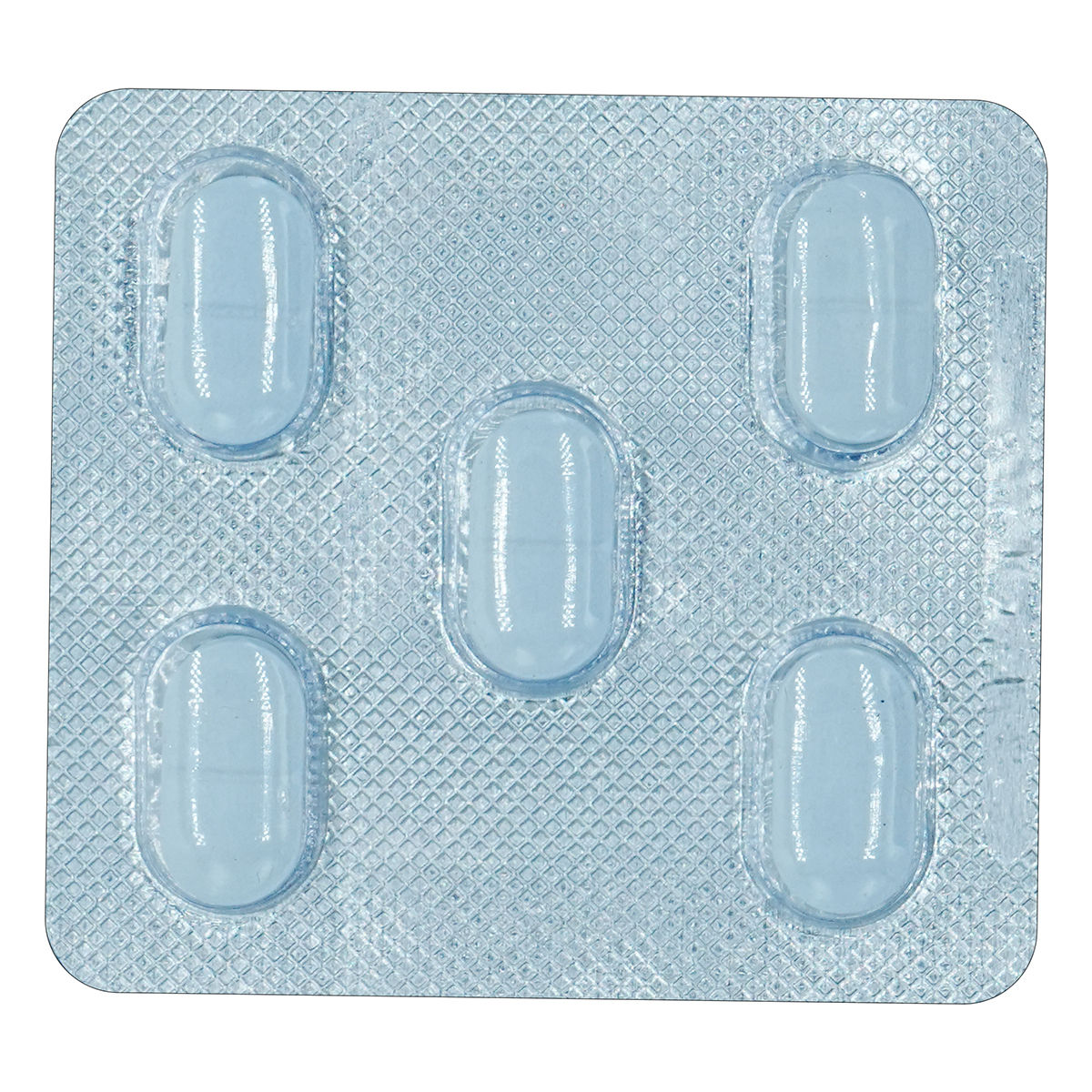
₹118.4*
MRP ₹131.5
10% off
₹111.77*
MRP ₹131.5
15% CB
₹19.73 cashback(15%)
Free Delivery
With Circle membership
(Inclusive of all Taxes)
This offer price is valid on orders above ₹800. Apply coupon PHARMA10/PHARMA18 (excluding restricted items)
Zady-500 Tablet is used to treat several bacterial infections in children. It contains Azithromycin, which works by inhibiting the production of essential proteins that are necessary for bacteria to grow, multiply and increase in numbers. Thus, it prevents the growth of bacteria. Give this medication to your child as prescribed by the doctor. This medication may cause common side effects such as diarrhoea, vomiting, headache, nausea or stomach pain.
Know Your Delivery Time
Provide Delivery Location
 Prescription drug
Prescription drugWhats That
 17 people bought
17 people bought 
Secure Payment

India's Most Trusted Pharmacy

Genuine Products
Composition :
Manufacturer/Marketer :
Consume Type :
Return Policy :
Expires on or after :
NPPA :
About Zady-500 Tablet
Zady-500 Tablet is used to treat several bacterial infections of the upper/lower respiratory tract, middle ear, skin and soft tissue. A bacterial infection is a condition in which harmful bacteria grow in the body and cause infection. It can infect any part of the body and multiply very quickly. Zady-500 Tablet does not work against infections caused by a virus.
Zady-500 Tablet contains Azithromycin, which works by inhibiting the production of essential proteins that are necessary for bacteria to grow, multiply and increase in numbers. Thus, it prevents the growth of bacteria.
Give Zady-500 Tablet to your child as prescribed by the doctor. Zady-500 Tablet may cause common side effects such as diarrhoea, vomiting, headache, nausea or stomach pain. Most of these side effects of Zady-500 Tablet do not require medical attention and gradually resolve over time. However, if the side effects persist or worsen, please consult your doctor.
If your child is allergic to Azithromycin or other medicines, please tell the doctor. Zady-500 Tablet should be used only in doses prescribed by a doctor for children. It is recommended that you complete the full course of Zady-500 Tablet as prescribed by the doctor, even if your child feels better after a few days.
Uses of Zady-500 Tablet
Directions for Use
Medicinal Benefits
Zady-500 Tablet belongs to a class of medications called antibiotics. It contains Azithromycin, which is used to treat several bacterial infections in children. Azithromycin inhibits the production of essential proteins that are necessary for bacteria to grow, multiply, and increase in number.
How Zady-500 Tablet Works
Storage
- Inform Your Doctor: Notify your doctor immediately about your diarrhoea symptoms. This allows them to adjust your medication or provide guidance on managing side effects.
- Stay Hydrated: Drink plenty of fluids to replace lost water and electrolytes. Choose water, clear broth, and electrolyte-rich drinks. Avoid carbonated or caffeinated beverages to effectively rehydrate your body.
- Follow a Bland Diet: Eat easy-to-digest foods to help firm up your stool and settle your stomach. Try incorporating bananas, rice, applesauce, toast, plain crackers, and boiled vegetables into your diet.
- Avoid Trigger Foods: Steer clear of foods that can worsen diarrhoea, such as spicy, fatty, or greasy foods, high-fibre foods, and dairy products (especially if you're lactose intolerant).
- Practice Good Hygiene: Maintain good hygiene to prevent the spread of infection. To stay healthy, wash your hands frequently, clean and disinfect surfaces regularly, and avoid exchanging personal belongings with others.
- Take Anti-Diarrheal Medications: If your doctor advises, anti-diarrheal medications such as loperamide might help manage diarrhoea symptoms. Always follow your doctor's directions.
- Keep track of your diarrhoea symptoms. If they don't get better or worse or are accompanied by severe stomach pain, blood, or dehydration signs (like extreme thirst or dark urine), seek medical help.
- Drink water or other clear fluids.
- To prevent worsening of pain, limit intake of tea, coffee, or alcohol.
- Include bland foods like rice, toast, crackers, and rice in your diet.
- Avoid lying down immediately after eating as it may cause indigestion or heartburn.
- Avoid acidic and spicy food as it may cause indigestion.
- Avoid taking raw fruits, nuts and vegetables.
- Do not share your personal things with others like toothbrushes.
- Clean the wounds and cuts using soap and water.
- Wash your hands thoroughly and frequently and maintain hygiene.
- Get a good quality of sleep.
- Consume more fruits, vegetables, and cruciferous foods like cabbage, kale, and broccoli.
- Reduced alcohol intake can enhance liver enzyme function.
- Oxidative stress can be managed by eating foods rich in antioxidants, such as vitamins C and E.
- Liver function tests regularly can help manage increased levels of AST.
- Nourish your body with a balanced diet with protein-rich foods like fish, eggs, and beans. Fruits, vegetables, and nuts provide essential vitamins and minerals. If necessary, consider vitamin B12 and folate supplements.
- Practice good hygiene to protect yourself from infections. Wash your hands often, stay up-to-date on vaccinations, avoid crowded areas, and take care when handling food, pets, and diapers.
- Aim for a good night's sleep, targeting 8 hours of sleep. Find calm through stress-reducing practices like yoga, meditation, or deep breathing. Regular physical activity can also help.
- Stay healthy by drinking plenty of water, eating probiotic-rich foods like yoghurt, and limiting processed foods and sugars. Consult your doctor if you are having any difficulties or concerns.
- Please inform your doctor about joint pain symptoms, as they may adjust your medication regimen or prescribe additional medications to manage symptoms.
- Your doctor may prescribe common pain relievers if necessary to treat joint discomfort.
- Maintaining a healthy lifestyle is key to relieving joint discomfort. Regular exercise, such as low-impact sports like walking, cycling, or swimming, should be combined with a well-balanced diet. Aim for 7-8 hours of sleep per night to assist your body in repairing and rebuilding tissue.
- Applying heat or cold packs to the affected joint can help reduce pain and inflammation.
- Please track when joint pain occurs and any factors that may trigger it, and share this information with your doctor to help manage symptoms.
- If your joint pain is severe or prolonged, consult a doctor to rule out any underlying disorders that may require treatment.
- Hydrate your body: Drink enough water to prevent dehydration and headaches.
- Calm Your Mind: Deep breathing and meditation can help you relax and relieve stress.
- Rest and Recharge: Sleep for 7-8 hours to reduce headache triggers.
- Take rest: lie down in a quiet, dark environment.
- Cold or warm compresses can help reduce tension.
- Stay Upright: Maintain good posture to keep symptoms from getting worse.
- To treat headaches naturally, try acupuncture or massage therapy.
- Over-the-counter pain relievers include acetaminophen and ibuprofen.
- Prescription Assistance: Speak with your doctor about more substantial drug alternatives.
- Severe Headaches: Seek emergency medical assistance for sudden, severe headaches.
- Frequent Headaches: If you get reoccurring headaches, consult your doctor.
- Headaches with Symptoms: Seek medical attention if your headaches include fever, disorientation, or weakness.
Drug Warnings
If your child is allergic to Azithromycin or other medicines, please tell the doctor. Zady-500 Tablet should be used only in doses prescribed by a doctor for children. You are recommended to complete the full course of Zady-500 Tablet as prescribed by the doctor, even if your child feels better after a few days.
Drug-Drug Interactions
Drug-Drug Interactions
Login/Sign Up
Co-administration of Zady-500 Tablet with Ziprasidone can increase the risk of irregular heart rhythm.
How to manage the interaction:
Although there is an interaction between Ziprasidone and Zady-500 Tablet but can be taken together if prescribed by a doctor. Contact a doctor immediately if you experience sudden dizziness, lightheadedness, fainting, shortness of breath. Do not discontinue any medications without consulting a doctor.
Taking Zady-500 Tablet along with edoxaban may raise the blood levels of edoxaban. This increases the possibility of significant or serious bleeding problems.
How to manage the interaction:
Though administration of Zady-500 Tablet alongside edoxaban can result in an interaction, it can be taken if a doctor has advised it. However, if you have any unusual bleeding or bruising, dizziness, lightheadedness, red or black, tarry stools, coughing up or vomiting fresh or dried blood that looks like coffee grounds, severe headache, and weakness, you should seek immediate medical attention. Do not discontinue any medications without consulting a doctor.
Taking Zady-500 Tablet with bedaquiline may increase the risk of an abnormal heart rhythm.
How to manage the interaction:
Although using Zady-500 Tablet alongside bedaquiline can result in an interaction, it can be taken if a doctor has advised it. However, if you experience sudden dizziness, lightheadedness, fainting, breathing difficulty, or rapid heartbeat, consult the doctor immediately. Do not stop any medications without a doctor's advice.
Taking Zady-500 Tablet with vemurafenib increases the risk of an abnormal heart rhythm. If you're dealing with other cardiac illnesses, electrolyte imbalances (for example, magnesium or potassium loss likely due to serious or prolonged diarrhoea or vomiting), you may be at greater risk.
How to manage the interaction:
Although administration of Zady-500 Tablet alongside vemurafenib can possibly result in an interaction, it can be taken if your doctor has advised it. However, if you experience sudden dizziness, lightheadedness, fainting, breathing difficulty, or rapid heartbeat, consult the doctor immediately. Do not stop any medications without a doctor's advice.
Taking Zady-500 Tablet with gatifloxacin may increase the risk of an abnormal heart rhythm.
How to manage the interaction:
Though administration of Zady-500 Tablet alongside gatifloxacin can result in an interaction, it can be taken if a doctor has advised it. However, if you experience sudden dizziness, lightheadedness, fainting, breathing difficulty, or rapid heartbeat, consult the doctor immediately. Do not stop any medications without a doctor's advice.
Taking Zady-500 Tablet with pazopanib may increases the blood levels of pazopanib. This increases the risk of serious side effects.
How to manage the interaction:
Although there is an interaction between Zady-500 Tablet and pazopanib, it can be taken if a doctor has advised it. However, consult a doctor if you experience fever, chills, joint pain or swelling, unusual bleeding or bruising, skin rash, itching, lack of appetite, nausea, vomiting, dark urine, and/or yellowing of the skin or eyes. Do not discontinue any medications without consulting a doctor.
Taking amisulpride with Zady-500 Tablet increases the risk of an abnormal heart rhythm.
How to manage the interaction:
Though using amisulpride and Zady-500 Tablet together can result in an interaction, it can be taken if a doctor has advised it. However, if you experience abrupt dizziness, lightheadedness, fainting, shortness of breath, or heart palpitations, get medical treatment immediately. Do not discontinue any medications without consulting doctor.
Taking Zady-500 Tablet with cabozantinb may increase the risk of an abnormal heart rhythm.
How to manage the interaction:
Although using Zady-500 Tablet alongside cabozantinb can result in an interaction, it can be taken if a doctor has advised it. However, if you experience sudden dizziness, lightheadedness, fainting, breathing difficulty, or rapid heartbeat, consult the doctor immediately. Do not stop any medications without a doctor's advice.
Taking Zady-500 Tablet with citalopram may increase the risk of an abnormal heart rhythm.
How to manage the interaction:
Although using Zady-500 Tablet alongside citalopram can result in an interaction, it can be taken if a doctor has advised it. However, if you experience sudden dizziness, lightheadedness, fainting, breathing difficulty, or rapid heartbeat, consult the doctor immediately. Do not stop any medications without a doctor's advice.
Taking Zady-500 Tablet with Moxifloxacin increases the risk of an abnormal heart rhythm.
How to manage the interaction:
Although administration of Zady-500 Tablet alongside Moxifloxacin can result in an interaction, it can be taken if a doctor has advised it. However, if you experience dizziness, breathing difficulty, or rapid heartbeat, consult the doctor immediately. Do not stop any medications without a doctor's advice.
Drug-Food Interactions
Drug-Food Interactions
Login/Sign Up
Diet & Lifestyle Advise
- Give probiotics after completing the full course to restore some healthy bacteria in the intestines that may have been killed.
- Probiotics after antibiotic treatment can reduce the risk of antibiotic-associated diarrhoea. Certain fermented foods like cheese, yoghurt, kombucha, sauerkraut, and kimchi can help to restore the good bacteria of the intestine. Include fibre-rich foods, as they can be easily digested by gut bacteria, which helps stimulate their growth. Thus, fibre-rich foods may help restore healthy gut bacteria after a course of antibiotics.
- Make sure your child drinks plenty of water or other fluids every day.
Habit Forming
Therapeutic Class
Product Substitutes
Alcohol
Not applicable
-
Pregnancy
Not applicable
-
Breast Feeding
Not applicable
-
Driving
Not applicable
-
Liver
Consult your doctor
If your child is suffering from liver disease, inform your doctor before using Zady-500 Tablet.
Kidney
Consult your doctor
If your child is suffering from kidney disease, inform your doctor before using Zady-500 Tablet.
Children
Safe if prescribed
Zady-500 Tablet should be used for children in dose and duration as advised by the doctor.

Have a query?
FAQs
Zady-500 Tablet is used to treat several bacterial infections of the upper/lower respiratory tract, middle ear, skin and soft tissue.
Zady-500 Tablet contains Azithromycin which works by inhibiting the production of essential proteins that are necessary for bacteria to grow, multiply and increase in numbers. Thus, it prevents the growth of bacteria.
Zady-500 Tablet is not used to treat viral infections. Zady-500 Tablet is an antibiotic which is used to treat only bacterial infections.
You are not recommended to stop giving Zady-500 Tablet to your child without consulting the doctor as it may worsen the condition or cause recurring symptoms. Therefore, use Zady-500 Tablet for as long as your doctor has prescribed it, and if your child experiences any difficulty while taking Zady-500 Tablet, please consult your doctor.
Zady-500 Tablet is used to treat bacterial infections. It does not treat fever, therefore, consult a doctor if your child has a fever. The doctor will prescribe suitable medicines to treat the child’s condition.
Zady-500 Tablet helps treat throat infections such as tonsillitis (inflammation of tonsils) and sore throat. Hence, it can be given to the child for treating throat infections if prescribed by the doctor.
If too much of Zady-500 Tablet is administered to the child they may feel unwell. Contact the doctor immediately if and take any remaining medicine with you.
Common side effects of Zady-500 Tablet include diarrhoea, vomiting, headache, nausea or stomach pain. Most of these side effects may not require medical attention and gradually resolve over time. However, if the side effects persist or worsen, please consult your doctor.
Zady-500 Tablet may cause serious side effects like severe or prolonged diarrhoea, severe skin rash, low blood pressure, serious skin reactions, rapid or irregular heartbeat, difficulty breathing, sudden wheezing, itching, and swelling of the face.
In some cases, using other medicines at the same time as Zady-500 Tablet may cause interactions. Therefore, consult the doctor if you are giving any other medicines to the child during treatment with Zady-500 Tablet.
Zady-500 Tablet may not affect how your child’s body responds to vaccines. However, it is advised to consult the doctor if the child is due to undergo any vaccination whilst on treatment with Zady-500 Tablet.
The doctor may recommend kidney and liver function tests if the child is on long-term treatment with Zady-500 Tablet.
Zady-500 Tablet may cause indigestion as a side effect and affect the child’s digestion. Include fibre-rich foods, fruits, vegetables and whole grains in the child’s diet. Give the child smaller meals throughout the day as it might help improve digestion.
The duration of treatment depends on the child’s condition. Therefore, stick to the treatment regimen as recommended by the doctor.
Zady-500 Tablet is not affected by food or drink. Therefore, it can be given with or without food.
Store dry powder below 30°C (86°F). Store constituted suspension between 5° to 30°C (41° to 86°F) and discard when full dosing is completed.
Country of origin
Manufacturer/Marketer address
Customers Also Bought
Disclaimer
Author Details
We provide you with authentic, trustworthy and relevant information











